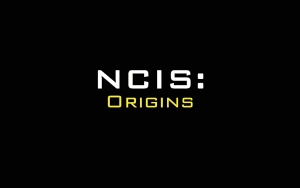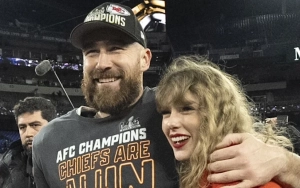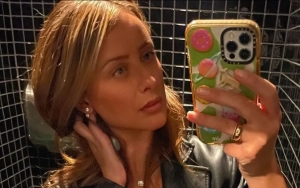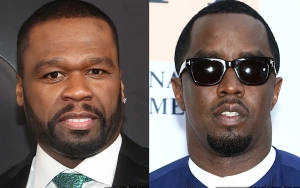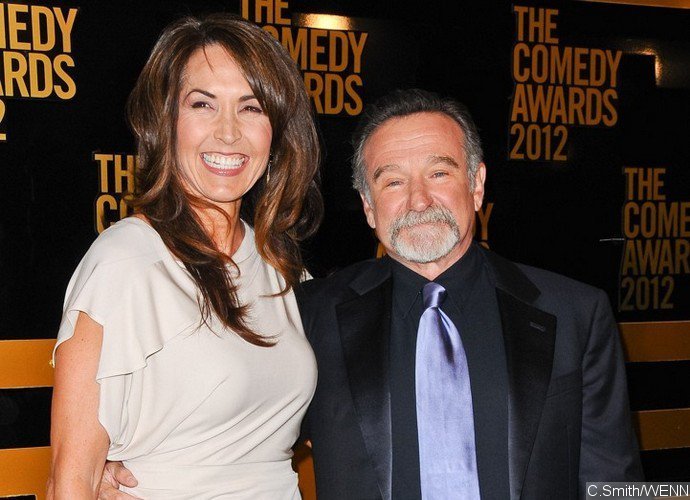
In a heartbreaking op-ed, Susan Schneider details her late husband's struggle with anxiety, delusions, insomnia, and loss of memory among other 'firestorm of symptoms.'
- Oct 2, 2016
AceShowbiz - Susan Schneider writes an emotional essay in the medical journal Neurology about her late husband Robin Williams' final months. In an op-ed titled "The Terrorist Inside My Husband's Brain", she opens up on his struggle with Lewy body dementia (LBD) that led to his suicide in 2014.
Schneider says the late star suffered from anxiety, delusions, insomnia, and loss of memory among other "firestorm of symptoms" that "seemed unrelated." She remembers he had a panic attack while filming "Night at the Museum: Secret of the Tomb" in Vancouver.
"During the filming of the movie, Robin was having trouble remembering even one line for his scenes, while just 3 years prior he had played in a full 5-month season of the Broadway production Bengal Tiger at the Baghdad Zoo, often doing two shows a day with hundreds of lines - and not one mistake. This loss of memory and inability to control his anxiety was devastating to him."
The actor's widow recalls, "He was very concerned with insecurities he was having about himself and interactions with others. We went over every detail. The fears were unfounded and I could not convince him otherwise. I was powerless in helping him see his own brilliance."
"For the first time, my own reasoning had no effect in helping my husband find the light through the tunnels of his fear. I felt his disbelief in the truths I was saying. My heart and my hope were shattered temporarily. We had reached a place we had never been before. My husband was trapped in the twisted architecture of his neurons and no matter what I did I could not pull him out."
"Powerless and frozen, I stood in the darkness of not knowing what was happening to my husband. Was it a single source, a single terrorist, or was this a combo pack of disease raining down on him?" she continues. "He kept saying, 'I just want to reboot my brain.' "
During a doctor visit, "he asked, 'Do I have Alzheimer's? Dementia? Am I schizophrenic?' The answers were the best we could have gotten: No, no, and no. There were no indications of these other diseases. It is apparent to me now that he was most likely keeping the depth of his symptoms to himself."
He was eventually diagnosed with Parkinson's disease less than three months before his death. He underwent therapy, worked out, and even learned "self-hypnosis techniques to quell the irrational fears and anxiety." Schneider says, "Throughout all of this, Robin was clean and sober," but "nothing seemed to alleviate his symptoms for long."
Only after his passing, an autopsy revealed that he suffered from Lewy body dementia. "But would having a diagnosis while he was alive really have made a difference when there is no cure? We will never know the answer to this. I am not convinced that the knowledge would have done much more than prolong Robin's agony while he would surely become one of the most famous test subjects of new medicines and ongoing medical trials," she says.
"Even if we experienced some level of comfort in knowing the name, and fleeting hope from temporary comfort with medications, the terrorist was still going to kill him. There is no cure and Robin's steep and rapid decline was assured."
"I have since learned that people with LBD who are highly intelligent may appear to be okay for longer initially, but then, it is as though the dam suddenly breaks and they cannot hold it back anymore. In Robin's case, on top of being a genius, he was a Julliard-trained actor. I will never know the true depth of his suffering, nor just how hard he was fighting. But from where I stood, I saw the bravest man in the world playing the hardest role of his life."
"Robin was losing his mind and he was aware of it. Can you imagine the pain he felt as he experienced himself disintegrating? And not from something he would ever know the name of, or understand? Neither he, nor anyone could stop it - no amount of intelligence or love could hold it back."
"Hopefully from this sharing of our experience you will be inspired to turn Robin's suffering into something meaningful through your work and wisdom," Schneider states. "It is my belief that when healing comes out of Robin's experience, he will not have battled and died in vain. You are uniquely positioned to help with this."





